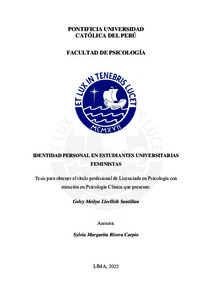| dc.contributor.advisor | Rivera Carpio, Sylvia Margarita | |
| dc.contributor.author | Llecllish Santillan, Gelcy Meilyn | |
| dc.date.accessioned | 2022-07-21T15:26:35Z | |
| dc.date.available | 2022-07-21T15:26:35Z | |
| dc.date.created | 2022 | |
| dc.date.issued | 2022-07-21 | |
| dc.identifier.uri | http://hdl.handle.net/20.500.12404/22870 | |
| dc.description.abstract | En una sociedad con problemáticas que atentan contra la integridad de las mujeres, el
movimiento feminista adquiere gran importancia entre las jóvenes estudiantes, presentándose
como una alternativa para denunciar esta situación y los abusos provenientes de la misma, así
como intentando cambiar la realidad de las mujeres. Por ello, la presente investigación tiene
como objetivo comprender los factores y las características que conforman la identidad
personal de un grupo de ocho estudiantes universitarias que pertenecen a una agrupación
feminista peruana y cuyas edades oscilan entre los 20 y 25 años. Con esta finalidad se empleó
una investigación cualitativa desde el enfoque fenomenológico, en la que, a partir de entrevistas
semiestructuradas realizadas a ocho participantes de una agrupación feminista, se analizaron
las vivencias y experiencias de estas estudiantes desde su identificación como feministas. Los
resultados mostraron el impacto que genera el discurso feminista en la identidad personal de
cada participante, evidenciando una conversión identitaria a través de características positivas
como el empoderamiento, autonomía, confianza personal y una imagen corporal positiva que
brinda mayor aceptación y valoración al cuerpo; las cuales van a determinar el autoconcepto
en cada una de ellas y la vinculación con su entorno. Asimismo, se identificó la intervención
de ciertos factores que influyeron previamente para la conformación de esta identidad, como
las vivencias de violencia de género, los estereotipos hacia las feministas, la inconformidad
con los roles de género y los entornos universitarios. | es_ES |
| dc.description.abstract | In a society with problems that threaten the integrity of women, the feminist movement
acquires great importance among young students, presenting itself as an alternative to report
this situation and the abuses that come from it, as well as trying to change the reality of women.
Therefore, the present research aims to understand the factors and the characteristics that define
the personal identity of a group of eight university female students who belong to a peruvian
feminist group with ages range between 20 and 25 years old. For this purpose, a qualitative
research from the phenomenological approach was used, in which, based on semi-structured
interviews carried out with eight participants from a feminist group, the experiences and
experiences of these students from their identification as feminists were analyzed. The results
showed the impact generated by the feminist discourse on the personal identity of each
participant, evidencing an identity conversion through positive characteristics such as
empowerment, autonomy, personal trust and a positive body image that provides greater
acceptance and appreciation of the body which would determine the self-concept in each one
of them and the link with their environment. Likewise, the intervention of certain factors that
previously influenced the conformation of this identity was identified, such as experiences of
gender violence, stereotypes towards feminists, disagreement with gender roles and university
environments. | es_ES |
| dc.language.iso | spa | es_ES |
| dc.publisher | Pontificia Universidad Católica del Perú | es_ES |
| dc.rights | info:eu-repo/semantics/openAccess | es_ES |
| dc.rights.uri | http://creativecommons.org/licenses/by/2.5/pe/ | * |
| dc.subject | Estudiantes universitarios--Investigaciones--Perú | es_ES |
| dc.subject | Feminismo--Perú | es_ES |
| dc.subject | Identidad (Psicología) | es_ES |
| dc.title | Identidad personal en estudiantes universitarias feministas | es_ES |
| dc.type | info:eu-repo/semantics/bachelorThesis | es_ES |
| thesis.degree.name | Licenciado en Psicología con mención en Psicología Clínica | es_ES |
| thesis.degree.level | Título Profesional | es_ES |
| thesis.degree.grantor | Pontificia Universidad Católica del Perú. Facultad de Psicología | es_ES |
| thesis.degree.discipline | Psicología con mención en Psicología Clínica | es_ES |
| renati.advisor.dni | 07885669 | |
| renati.advisor.orcid | https://orcid.org/0000-0003-0083-9810 | es_ES |
| renati.author.dni | 72242391 | |
| renati.discipline | 313026 | es_ES |
| renati.juror | Rivera Carpio, Sylvia Margarita | es_ES |
| renati.juror | Rodríguez Espartal, Noelia | es_ES |
| renati.juror | Pease Dreibelbis, María Angélica | es_ES |
| renati.level | https://purl.org/pe-repo/renati/level#tituloProfesional | es_ES |
| renati.type | https://purl.org/pe-repo/renati/type#tesis | es_ES |
| dc.publisher.country | PE | es_ES |
| dc.subject.ocde | https://purl.org/pe-repo/ocde/ford#5.01.00 | es_ES |






